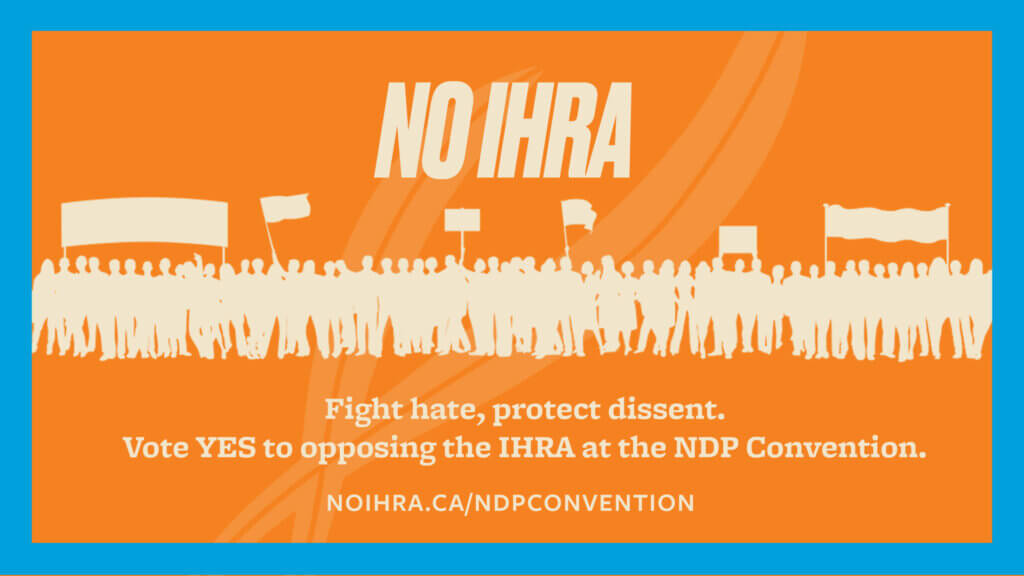The pro-Palestine resolution that passed this weekend at Canada’s New Democratic Party (NDP) convention was a significant step forward; the struggle now is to make sure it is implemented and followed, not lost in some bureaucratic abyss as happened to other policy items after the 2018 NDP convention.
However, the dust-up over another proposed resolution to reject the IHRA definition of antisemitism led to that issue being buried during the prioritization process. This process allowed for electronic voting two days before the convention began, on the priority of resolutions to be discussed, ranked within different categories. Although this was an improvement over the traditional “closed-door” system that had succeeded in preventing any pro-Palestine resolution from ever reaching the floor in prior conventions, it also meant the Zionist lobby had to step up their game to defeat the broadly supported #NoIHRA resolution. For almost a month, there was a fierce onslaught by Zionist lobby groups in Canada to challenge the content and even the “legitimacy” of this resolution.
At the end of the day, their efforts were successful enough to push the resolution down to #6 on the priority list in “Redefining Canada’s Place in the World”. Due to the virtual nature of the convention and other technical glitches, most categories dealt with only 2 resolutions. The pro-Palestine resolution that did pass was ranked #2 in the same category.
#NoIHRA
Along with the usual arguments made by pro-Israel advocates that the IHRA is not “legally binding” and “allows for criticism of Israel”, there was another insidious defense put forward and emphasized in the weeks leading up to convention. A letter sent to the NDP leader, reportedly spearheaded by the Centre for Israel and Jewish Affairs CIJA and signed by dozens of organizations, stated: “A rejection of the IHRA definition of antisemitism is tantamount to telling the Jewish community that we cannot define our own oppression” and went on to say the NDP should not be involved in “choosing how – or how not – to define antisemitism for Jewish people.” Another proponent on Twitter even used the slogan “Nothing about us, without us”.
For Palestinians, whose voices are so marginalized and will be even more marginalized by the IHRA, this level of hypocrisy was stunning. Have Palestinians ever been included in debates over what constitutes anti-Palestinian racism? For that matter, is any major political formation even interested in discussing it? If they were, Palestinians would tell them that the IHRA definition is the embodiment of anti-Palestinian racism. Its examples specifically limit how every Palestinian can describe and narrate their own history and censor their critique of the political movement Zionism, that decimated their nation and way of life.
If the IHRA definition had limited itself to just that, a definition, then we would not be having this discussion. But since it insists on adding its “illustrative examples”, then we are dealing with a much broader political issue. Would anyone accept a definition of Islamophobia that included multiple restrictions on when you could criticize Saudi Arabia, for example? I think not.
The Zionist lobby in Canada is happy to call on all levels of government, as well as many institutions like universities and churches, to adopt (and implement) the IHRA. So, it is acceptable for others to discuss and vote on this definition of antisemitism, so long as you are in favor of it and will pass it. If there is a chance of strong opposition, then suddenly the debate becomes inappropriate.
Progressive Jews who were a strong component of support for the #NoIHRA resolution also found themselves under attack, accused of being “tokens”. Many of them responded on social media, 60 Jewish members of the NDP put out a letter and several had a statement published in an alternative newspaper.
But the damage was done, the chill set in and even one NDP Member of Parliament felt the need to distance himself at the last moment from the #NoIHRA resolution.
Next steps
The next steps in the #NoIHRA campaign will be crucial; pro-Israel lobby groups would like to use the legitimate debate around the IHRA to divert public attention from Israel’s own anti-Palestinian racism and continued war crimes against the Palestinian people. As I noted in an earlier Mondoweiss article on the appointment of Irwin Cotler as Canada’s special envoy: “It is very likely that pro-Israel advocates know full well the contradictions in this definition and that it would probably never stand up to a legal challenge. But that’s not the point. The point is that they have succeeded in not only defining and confining the parameters of pro-Palestine discourse, but have also successfully appointed themselves as the arbiters of what will constitute acceptable criticism of Israeli policies.”
The IHRA is a dangerous piece of institutionalized anti-Palestinian racism, that should not receive legitimacy of any kind. However, for Palestinians and their supporters in Canada, repression is already in full swing and they are subjected to workplace harassment, visits at home by security forces, and accusations of “terrorism”.
It is imperative to hold the NDP leadership to account over the new pro-Palestine resolution, but also to call out all levels of government in Canada that are complicit in sustaining and enabling Israeli war crimes and the continuing oppression of the Palestinian people. Our response to the Zionist lobby’s onslaught to try and delegitimize the Palestine solidarity movement must be to intensify the work on all our campaigns – one struggle, many fronts.



Let’s begin at the beginning: The IHRA’s “illustrative examples” are neither illustrative nor examples. They are prescriptive dictates. They were not crafted in consultation with the public, any public, and certainly not the Palestinian public and are therefore fundamentally imperious. In essence, Organized Zionism is (attempting) to tell the public which words, contexts and interpretations it may use when discussing Zionism or Israel.
The local, state, federal, corporate, religious and academic institutions that have “adopted” the IHRA will likely one day retract their endorsement and apologize abjectly for ever having given it their approval. More than likely they will claim they did not understand its true impact or that they were acting to protect the Jewish members of their institutions or communities. The IHRA does nothing, repeat, nothing to make the world a safer place for Jewish people.
As for the CIJA’s claim that: “A rejection of the IHRA definition of antisemitism is tantamount to telling the Jewish community that we cannot define our own oppression”, we must ask: Does the CIJA’s claim extend to all religious groups? Does it extend to Muslims and Islamophobia? Would CIJA accept a definition of Islamophobia that identified Israel/Zionism as a source of anti-Muslim oppression? Can the Palestinian people, by extension of the CIJA claim, assert a right to define political Zionism as the source of their oppression?
Moreover, even if one accepted the CIJA’s preposterous claim (I do not) that does not mean that the wider society has to accept or endorse its definition. The basic principle of lexicography is that the terms defined in a dictionary are accepted voluntarily by the society in which it is published.
Acceptance is based upon whether or not the public accepts the content of a definition, that is, whether or not the definition is descriptive of the term in question and makes sense to the reader. The IHRA is so poorly written, so desperately promoted, so incomprehensible that it has become an international focal point for dissent, rejection, ridicule and most recently a rational, though admittedly imperfect, initial response in the form of the Jerusalem Definition of Antisemitism. The IHRA is too deeply flawed to serve purpose and will likely linger on as an albatross around Zionism’s neck and serve as an object lesson to ideologues everywhere to rethink any effort to limit the language rights of citizens of mature democracies.
I agree with Marion Kawas that the power of the IHRA re-definition is how it frames an understanding of what is antisemitism – to include criticism of Israel and Zionism. The IHRA – by itself – is not as dangerous as is the IHRA lobby and their use of the IHRA campaign.
The IHRA lobby has been clear about their intentions to use this “working definition” against progressives. They have a sordid history of defaming Palestinian supporters as “antisemites” for supporting Palestinian rights or criticizing Israel and Zionism.
Their own words illustrate how they will go after people and organizations who hold consistent positions against antisemitism and for Palestinian human rights. For example, in September 2018, the Centre for Israel & Jewish Affairs (CIJA) stated: “We are launching a national campaign to have government and police adopt the International Holocaust Remembrance Alliance (IHRA) definition of antisemitism…because it explicitly confirms that anti-Zionism is antisemitism.”
This is just one example among many that shows how the IHRA definition can and will be used by the Israel lobby against people who hold consistent positions for human rights.
No one and no group is entitled to demand agreement without reason for any claim whatever about injustice to itself. Not even the Palestinians, not that they need it.